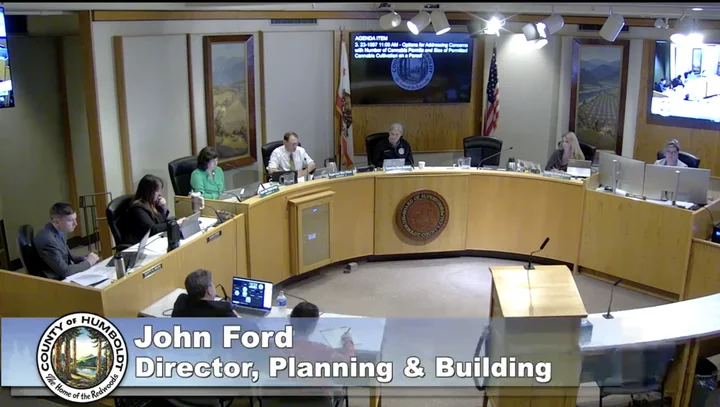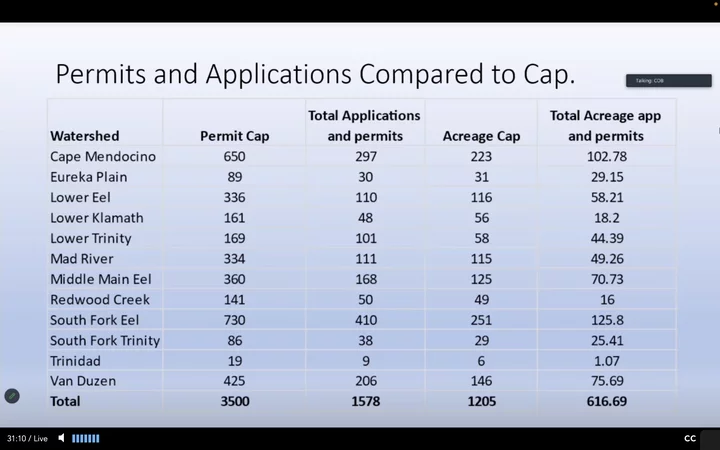The Humboldt County Board of Supervisors. | Screenshot.
###
Facing pressure from the Humboldt Cannabis Reform Initiative (HCRI), an upcoming ballot measure that would place stringent and intractable new restrictions on commercial cannabis, the Humboldt County Board of Supervisors today sought to preemptively address some public concerns about the existing county regulations on the industry.
Backers of the controversial HCRI, which will appear on March ballots as Measure A, have declined offers to work with county officials in hopes of finding some middle ground. They argue that their initiative is necessary to prevent large-scale cannabis operators from continuing to run amok at the expense of the environment and neighboring property owners.
Opponents of the measure, including members of the Humboldt County Growers Alliance (HCGA), say it would institute draconian limitations that would harm even small-scale growers at a time when the local industry is struggling to survive, and they point to the difficulty of modifying rules passed through voter initiatives, which can only be changed or repealed through subsequent ballot measures.
Today, the Board of Supervisors (minus First District rep Rex Bohn, who is out of town attending a meeting of the National Association of Counties) discussed some possible changes to the county’s existing Commercial Cannabis Land Use Ordinance, changes that they hope might allay some of the public concerns that gave rise to Measure A in the first place.
Specifically, they discussed lowering the cap on the total number of cultivation permits available countywide, reducing the acreage of cultivation area allowed in each county watershed and limiting individual grow operation to no more than one acre, without exceptions for very large property owners or people taking advantage of the county’s Retirement, Remediation and Relocation (RRR) program.
Planning and Building Director John Ford explained that the supervisors have a variety of options, including placing a temporary or permanent moratorium on cultivation permits or modifying the existing ordinance either directly or via a voter initiative of their own design.
Staff’s recommendation was to develop a referendum to be presented to voters in March, alongside Measure A, one that offers some less drastic changes to the existing rules.
Namely, Ford explained, staff was suggesting a 60 percent across-the-board reduction on some current limits. For example, a 60 percent cut to the cap on cultivation permits would reduce the maximum from 3,500 to 1,400 permits. That mark is slightly below the current number of permits plus pending applications (1,578), though Ford said it’s reasonable to expect some attrition given the current state of the industry.
Staff also recommended a 60 percent cut to existing permit and acreage caps in each county watershed. Those caps are listed below, alongside the existing numbers of permits and applications, and total the permitted acreage contained within:
The Humboldt County Growers Association asked for a slightly higher limit on total cultivation permits — 10 percent above the current number of permits and applications.
Measure A, meanwhile, would establish a cap of somewhere around 1,200.
The four supervisors present at today’s meeting peppered Ford with questions about the options available to them.
During the public comment period, backers of Measure A, including Kneeland residents Mark Thurmond and Elizabeth “Betsy” Watson, accused the county of trying to sabotage their voter initiative. Thurmond described the proposal laid out in the staff report as “a deceptive attempt to undermine and defeat Measure A.”
Watson called it “a transparent effort to confuse voters.”
On the other side of the issue, HCGA Policy Director Ross Gordon argued that members of the public were misled into signing the Humboldt Cannabis Reform Initiative, and some of the county’s current ideas would do a better job of achieving that measure’s purported goals.
After a good deal more discussion among board members and staff, Third District Supervisor Mike Wilson wound up making a motion that sought to incorporate each of their concerns.
His motion directed staff to come back at a future meeting with some proposed language for a new referendum, one that would mostly follow staff’s recommendations. The rough outlines for this referendum, as hashed out during today’s meeting, would lower the cap on the total number of cannabis permits countywide, though the exact number will remain up for debate — likely somewhere between the 1,400 suggested by staff and the 1,600-plus advocated by the HCGA. (Second District Supervisor Michelle Bushnell said she’s onboard for that higher cap, but no other supervisors agreed.)
The referendum will likely also include a lowered cap on total cultivation acreage allowed in each watershed and the one-acre max for each grow operation.
The board also asked staff to include language that would allow the rules ushered in through this referendum to be changed by the Board of Supervisors, but only through a four-fifths vote from their body, and only if the changes are based on sustained findings of fact, with sign-off from environmental regulatory agencies including the California Department of Fish and Wildlife, the North Coast Regional Water Quality Control Board, the State Water Resources Control Board and the Department of Forestry and Fire Protection.
Per a suggestion from Wilson, the referendum may also include language directing the board to work on addressing some other problematic aspects of existing cannabis regulations, including water and energy use and the public notification process.
If the board does hope to get a competing voter measure on March ballots, it will have to work quickly. Draft ordinance language must be submitted to the Humboldt County Elections Office no later than December 9, which gives the board less than a month to craft and finalize a proposal.
The proposed referendum will be brought back to the board for further discussion and refinement at an upcoming meeting.
###
PREVIOUSLY:
- An Initiative to Reshape Humboldt’s Cannabis Industry Qualified for the Ballot, and It Has Growers Worried
- Supes Agree to Put Controversial Weed Initiative on 2024 Ballot, Though They Hope to Work With Organizers on Alternatives
- Humboldt County Cannabis Farmers Blast ‘Misleading’ Ballot Initiative That Would Impose New Restrictions on Cultivators; Supervisors Form an Ad Hoc Committee to Work on Alternatives
- Proponents of the Humboldt Cannabis Reform Initiative Are Calling Out the Board of Supervisors, County Staff for Allegedly Distorting the Intent of the 2024 Ballot Measure
- Another Day of Cannabis Reform Initiative Panic at the Board of Supes; It’s Now All But Certain That Voters Will Decide on the Controversial Measure on the March 2024 Ballot
- Humboldt Supervisors Partially Reinstate Measure S Cannabis Cultivation Tax at 10 Percent as Market Shows Signs of Stabilization
- ‘Cannabis Reform Initiative’ Legal Challenge Filed: Small Farmers, Industry Reps Ask the Court to Kick Next Year’s ‘Measure A’ Off the Ballot
- Arcata City Council Unanimously Opposes Measure A, the ‘Humboldt Cannabis Reform Initiative’
###
CORRECTION: This post has been corrected to reflect that the proposed referendum would reduce current caps by 60 percent, to a level 40 percent of the existing caps. The Outpost regrets the error.


CLICK TO MANAGE